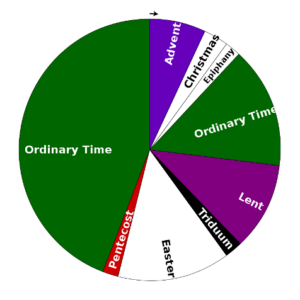“Ordinary time” marks the seasons of the Christian calendar that fall between the great feasts of Easter and Christmas and the periods of preparation that lead up to them.
The shortest stretch of Ordinary Time is between Epiphany and Lent, with a longer stretch of Ordinary Time that runs from Pentecost to Advent.
If the Christian calendar is built around the birth, life, death, and resurrection of Jesus, we can see the flow:
- Advent, Christmas, and Epiphany = Annunciation, Birth, and Visit of the Magi
- Ordinary Time
- Lent, Triduum (Maundy Thursday through Easter Sunday), Pentecost = Ministry, Passion and Resurrection, and Sending of the Spirit.
- Ordinary Time
Advent is the beginning of the Christian year, then Christmas, then a period of patience as we enter into Lent and then the passion and resurrection. It makes sense that, just as in the gospel, there is a gap between Jesus as a boy and when Jesus begins his public ministry that ends with his resurrection and sending of the Spirit. Likewise the period after Pentecost is a period of fruitful work of the early church in the power of the Spirit.
Bobby Gross, in Living the Christian Year, says this well:
In the Cycle of Light we celebrated the incarnation (God with us); in the Cycle of Life we contemplated salvation (God for us); now in Ordinary Time we concentrate on the outworking of that redemption (God through us). The incarnate and risen Christ is present in the world now in a different way: the Spirit indwells the believer to enable a fruitful life and empowers the church to engage in redemptive mission.
This is helpful to guide us as we think about the meaning of “Ordinary Time.” There’s truly nothing “ordinary” about it.
During those times of year when we shift away from the high celebrations of the church, think about how the early followers of Jesus felt as they no longer had the physical presence of their Lord.
Were they bored or disengaged?
No!
They were filled with the Spirit and carrying out the work of Jesus in a world that needed the “extraordinary” good news.
Check out my Servant School Course: The Gospel in the Art Gallery.



